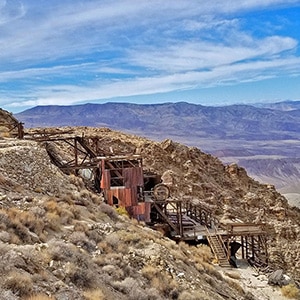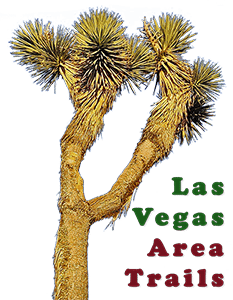Skidoo Ghost Town & Mill, located near Emigrant Canyon in the Panamint mountain range above Death Valley, California, is an old California gold rush ghost town. The hills around Skidoo Ghost Town & Mill have around 1,000 abandoned mines along with the remains of iron machinery, wooden cabins, old rusting cars and other odds and ends from the mining era. The largest, most impressive remaining structure is the Skidoo Stamp Mill used to extract gold from raw ore. The Skidoo Stamp Mill is built on a steep hillside which slopes 3,000ft down towards Telephone Canyon. Its location on the slope was due to the use of running water and gravity in the gold extraction process.
Just to be in Skidoo, in the midst of all this historic activity, is to feel the energy of its inhabitants, though long gone, anticipating that great “breakthrough” in their search for sudden, hidden wealth. “This claim of mine may be the mother lode!” “This is my path to fortune!” 1000 mines in the hills around Skidoo Ghost Town & Mill — each one signifying someone’s hopes and dreams. Each one requiring a huge investment of work, sweat…sometimes life, in the unforgiving heat of the desert sun just 6000ft above Death Valley, one of the hottest places on earth.
The rock through which these miners bore their tunnels is a solid wall of stone. You can see it in the walls that make up the entrance to the 1000 mine shafts, many vertical plunging straight downward into black darkness.
And then, there’s the huge Stamp Mill, a monument of ingenuity and creativity. Imagine the mechanical parts that had to be fashioned, many on the spot from raw materials. Or, parts and materials had to be hauled for days through deep canyons, over mountains by pack animal where there were long wilderness stretches with no roads. And what if after all that, the part didn’t fit or perform right? Then there’s the water that powered the Stamp Mill…piped from a spring 23 miles away on Telescope Peak. Imagine finding that spring, then laying and connecting 23 miles of steel pipe at an angle that would create a steady downward flow.
Skidoo Ghost Town & Mill is truly a unique place with its own feel, tucked away in the mountains above Death Valley.
Eureka Mine and the Ghost Town of Harrisburg
Rhyolite Ghost Town and its Montgomery Shoshone Mine
From Las Vegas take Hwy 190 through Pahrump. Continue on 190 through Death Valley. Pass Furnace Creek and Stovepipe Wells (Skidoo Ghost Town & Mill is about 27 miles from Stovepipe Wells). Turn left at Emigrant Campground onto Emigrant Canyon Road. In 9.4 miles turn left at the well marked sign for Skidoo. The ghost town of Skidoo is 7 miles up the road. Reach the Skidoo Stamp Mill in another 2 miles. Along the way there are 3 unmarked forks in the road. Keep to your left at each fork.
Take your time on the 9-mile approach road to Skidoo Ghost Town & Mill. The road itself is very well graded and easily manageable in a 2WD vehicle. I traveled it by mountain bike. You’ll notice there are a number of side roads branching off from the main road. These side roads lead to additional mining sites, each with a small cabin for the miners and its own mining claim. Many of the sites along the approach road are from the 1940s and 1950s after most of the activity and residents of the town of Skidoo had left. These additional mining sites appear to have scavenged materials from the town (wood, metal…etc.) to construct their cabins and mines. The walls of one cabin are made from old railroad (or mining cart) ties and a shutter on its main window looks as if it was once a tabletop with the painted squares of a chess board (see the video on this page). So, don’t limit your exploration to the old townsite of Skidoo and the stamp mill.
As you continue on the main Skidoo road you will reach a high point at about 6,000ft. Here views some brief spectacular views down to and across Death Valley open up. If you look carefully, you can see the faint distant outline of the Mt. Charleston Wilderness just outside of Las Vegas. Not far beyond there is an old road marked by a wilderness sign (no motorized traffic allowed) branching off to the right and apparently heading down to the edge of the West side of Death Valley and potentially beyond.
After a few bends in the road you’ll reach the old Skidoo ghost town site. There’s a pull-out with an interpretive sign and picture of the town of Skidoo at its height from 1907-1917. However, looking over the landscape there are absolutely no signs of habitation. It’s just empty desert with scrub brush. All human history has vanished. I did not explore the site closely, so perhaps there are some hidden remaining odds and ends there.
From the townsite you can see evidence of mining activity in the surrounding hills. Many roads branch off, and you can see multiple mine shafts on the hill sides. It could be a worthwhile experience to take a day and travel all these side roads. You might be rewarded with some rare finds, missed by those, like me, who just continued on the main road for the 2 remaining miles to the the site of the Skidoo Stamp Mill.
As you approach the end of Skidoo Road there is increased evidence of mining activity. There’s a mining structure down in the canyon to the right along with the rusty remains of an old abandoned automobile (1920s – 4os vintage?). There’s also a large mine shaft going straight into the solid rock hillside with dimensions generous enough to have accommodated mining carts on rails.
The Skidoo road ends with a gated off section about 600ft before the historic Skidoo Stamp Mill. That last 600ft is an easy walk and well worth it. There, just around the corner, appears the huge remaining structure of the Skidoo Stamp Mill, sloping down a couple hundred feet into Telephone Canyon. Approaching the Skidoo Stamp Mill, one can see the remains of a huge pipeline, possibly the end of the 23-mile pipeline that began at a mountain spring on Telescope Peak. Upon closer inspection, the old structure has been secured by new cables anchored into the ground holding up key weak points. I completed a complete circuit of the structure down one side to the base and up the other side. See the video on this page.
There are a few inviting entrance points into the Skidoo Stamp Mill structure, but I avoided these as it appeared it would not take a lot of pressure to bring beams down on my head, further demolishing the historic structure. I also steered clear of the huge cyanide tanks lining the base of the structure as these are said to be leaking hazardous materials to this day. Still, a circuit of the Skidoo Stamp Mill is well worth it as it is a model of ingenuity, creativity and persistence in the early 1900s.
Continuing above the Skidoo Stamp Mill, there are numerous abandoned mine shafts and one can see many more mine shafts and mining structures in the surrounding hills ahead. Again, a day of careful inspection and discovery could be richly rewarded. And the views are spectacular, all the way down the canyon to the surrounding mountains beyond and in one spot, all the way down into the Northern area of Death Valley beyond Stovepipe Wells. In the other direction, there is a clear view of Telescope Peak, 23-miles distant, the beginning of the Skidoo pipe line.
On this day, I just continued to explore about 1000ft beyond the Skidoo Stamp Mill before returning to my mountain bike for the 9-mile return trip to the beginning of Skidoo Road at its intersection with Emigrant Road.
In 1906, two miners traveling to nearby Harrisburg, located on the Aguereberry Point road, discovered gold in the Skidoo Ghost Town & Mill area. By 1907 James Arnold, proprietor of the Skidoo Trading Company, had founded Skidoo. Skidoo existed for just 10 years from 1907-1917 until 75,000 ounces of gold worth $1,600,000 (at $20/ounce) had been extracted from the surrounding hills depleting the gold ore in the area. The total cost of the operation as about $300,000 leaving about $1,300,000 in profit amounting to an average of about $130,000 per year. It doesn’t seem like much for all that work, but in 2021 dollars the profits would amount to nearly $3,000,000 per year.
These profits helped support the 700 residents of Skidoo, including over 100 mine workers, along with the town’s telephone exchange, post office, newspaper press, school and bank. The mine was managed by Matt Hoveck for whom the post office was originally named. Some mining sporadically continued until 1942 and by the 1980s most of the town’s buildings were gone.
Where there’s a lot of money, there is bound to be some drama. In 1908 Joe Stimpson, co-owner of the Gold Seal Saloon with his partner Fred Oakes, was accused of murdering James Arnold. An angry mob hung him from a telephone pole. Legend (unproven) has it that the towns people dug Stimpson up and re-hung him for the benefit of the press, so Stimpson is referred to as “the man who was hung twice“.
As mentioned, the Skidoo Stamp Mill extracted gold from ore by means of water and gravity. It was the only water-powered mill in the Death Valley area. The water was piped from a spring 23 miles South on Telescope Peak. The locals believe this was the origin of the slang term “23 Skidoo” which was used to mean “go away”, “beat it”, “scram” while the going is good! Curiously, the term “Skedaddle“, which originated in the 1800s, may have contributed to the meaning of “23 Skidoo“.
In addition to the early 20th century gravity-feed system for separating gold form its ore, there are 4 mercury amalgamation tables and nine large cyanide tanks which still leach cyanide into the environment causing an environmental hazard. Antimony, arsenic, lead, mercury, molybdenum and zinc were found between 2014 and 2016 at levels above natural background conditions, so at this time the gold ore extraction area is closed to the public while it’s being determined how to clean up the pollutants.



Return often to experience one new adventure each week! From the home page scroll to “Most Recent Adventures“. More about David Smith…
The trail adventures on this website require proper conditioning, preparation and safety precautions. There are many factors beyond our control including weather conditions, unstable ground, loose rocks, insects and snakes, people you may encounter, your own level of physical conditioning, the potential of getting lost just to mention a few. While this site offers guidance, helpful tips, direction and training, the reader assumes full responsibility for whatever may occur during their trail adventure. Have fun and be safe!